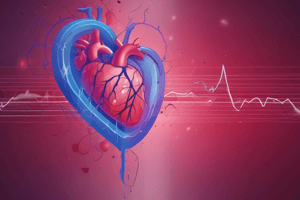Podcast
Questions and Answers
What is the primary cause of heart failure?
What is the primary cause of heart failure?
- Impaired ability of the heart to adequately fill with blood
- Impaired ability of the heart to eject blood
- Impaired ability of the heart to pump sufficient blood
- All of the above (correct)
Which of the following is a symptom of heart failure?
Which of the following is a symptom of heart failure?
- Anxiety
- Dyspnea (correct)
- Hypertension
- Diabetes
What is a primary goal of heart failure therapy?
What is a primary goal of heart failure therapy?
- Improve cardiac output (correct)
- Reduce blood pressure
- Increase cardiac workload
- Manage blood glucose levels
What is a consequence of heart failure?
What is a consequence of heart failure?
What is an important aspect of heart failure management?
What is an important aspect of heart failure management?
What is the underlying physiological mechanism of heart failure?
What is the underlying physiological mechanism of heart failure?
Which of the following is a consequence of unmanaged heart failure?
Which of the following is a consequence of unmanaged heart failure?
What is the primary focus of heart failure therapy?
What is the primary focus of heart failure therapy?
How does heart failure affect the body?
How does heart failure affect the body?
What is a critical component of heart failure management?
What is a critical component of heart failure management?
Flashcards are hidden until you start studying
Study Notes
Heart Failure
- Heart failure is a disorder where the heart is unable to pump sufficient blood to meet the body's needs.
- The heart's inability to adequately fill with and/or eject blood leads to heart failure.
- Common symptoms of heart failure include dyspnea, fatigue, and fluid retention.
Goals of Heart Failure Therapy
- Control edema (excess fluid) to alleviate symptoms and improve overall health.
- Improve cardiac output to ensure the heart pumps sufficient blood to meet the body's needs.
- Reduce cardiac workload to prevent further heart strain and damage.
- Support myocardial function to maintain the heart's ability to function properly.
- Manage concurrent arrhythmias (abnormal heart rhythms) to prevent further complications.
Heart Failure
- Heart failure is a disorder where the heart is unable to pump sufficient blood to meet the body's needs.
- The heart's inability to adequately fill with and/or eject blood leads to heart failure.
- Common symptoms of heart failure include dyspnea, fatigue, and fluid retention.
Goals of Heart Failure Therapy
- Control edema (excess fluid) to alleviate symptoms and improve overall health.
- Improve cardiac output to ensure the heart pumps sufficient blood to meet the body's needs.
- Reduce cardiac workload to prevent further heart strain and damage.
- Support myocardial function to maintain the heart's ability to function properly.
- Manage concurrent arrhythmias (abnormal heart rhythms) to prevent further complications.
Studying That Suits You
Use AI to generate personalized quizzes and flashcards to suit your learning preferences.



